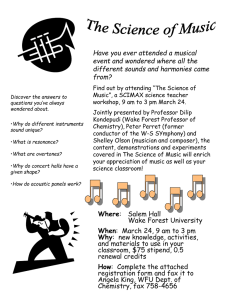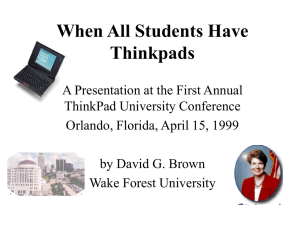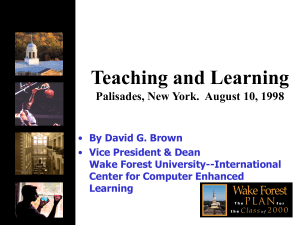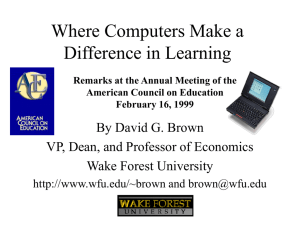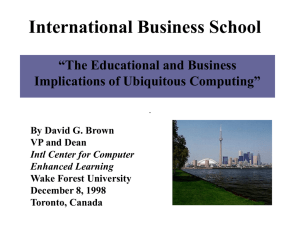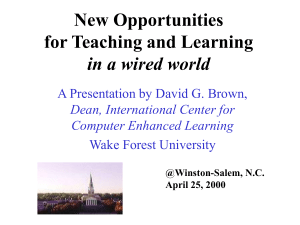What are Your Teaching Objectives? For the Moment Forget about Technology
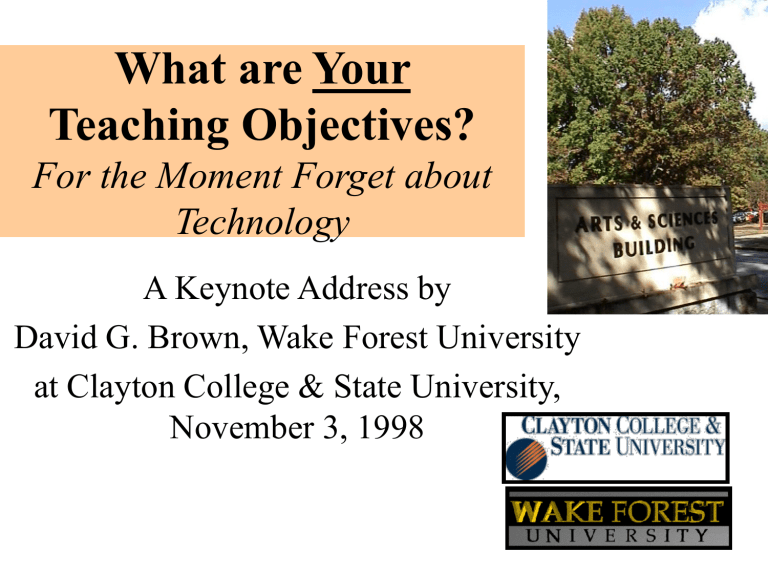
What are Your
Teaching Objectives?
For the Moment Forget about
Technology
A Keynote Address by
David G. Brown, Wake Forest University at Clayton College & State University,
November 3, 1998
Friday, October 30, 1998
Two of Georgia's Smallest Colleges
Offer Laptop for Every Student
By JEFFREY R. YOUNG
Electron Microscope Garden Tools
5 Items for the Portfolio for the
Dean @ Salary Increase Time
• 1
• 2
• 3
• 4
• 5
Five Phrases That Best Characterize
Your Teaching Philosophy
• 1
• 2
• 3
• 4
• 5
Pick Your Top & Next Two
Principles of Good Teaching
• Encourage contact between students and faculty
• Develop cooperation among students
• Encourage active learning
• Give prompt feedback
• Emphasize time on task
• Communicate high expectations
• Respect diverse talents and ways of thinking
FIRST YEAR SEMINAR
The Economists’
Way of Thinking
A Course Required of All Freshmen
Wake Forest University
Learning is Enhanced by---
• Collaboration among Learners
• Frequent student/faculty dialogue
• Prompt Feedback
• Application of Theory
• Student Self Initiatives
• Trustful relations
• Personal & Individual Teaching
Results: Compared to Other
First Year Courses
More
How much did you learn?
How much time did you spend?
2/3
--
How much did you enjoy the course?
3/3
Same Less
1/3
2/3
--
--
1/3
--
Presidential Ideas About Learning
• Trust Theory
• Infectious Enthusiasm
• Rational Civility
• Education as Servant of Society
• Different Strokes for Different Folks
• More Talented Than You Think
• Liberal Arts
• Education Throughout Life
Results from
Wake Forest
Faculty Survey Results from Wake Forest
===83% say “computers are effective for communicating with students about class related work
===91% say “computers are effective for communicating with faculty colleagues
Student Survey Results from Wake Forest
===72% say “computers are effective for communicating with other students about class related work”
===84% say “computers are effective for communicating with faculty about class related work”
===53% interact more with faculty, up from
32%
Computers Enhance My
Teaching and/or Learning Via--
Presentations
Better--20%
More Opportunities to
Practice & Analyze--35%
More Access to Source
Materials via Internet--43%
More Communication with Faculty Colleagues, Classmates, and Between Faculty and Students--87%
Computers allow people----
• to belong to more communities
• to be more actively engaged in each community
• with more people
• over more miles
• for more months and years
• TO BE MORE COLLABORATIVE
The paradigm shift is the increase in team learning, in collaboration as the standard method for study and work
It is not computers!
Computers are means only.
The Case for Collaborative Learning
• #1 Virtually all of the learning gain from computers stems from improved communication --Testimony of Wake
Forest students and faculty.
• #2 Computers haven’t improved learning.
Computers have enabled more collaboration.
More collaboration has improved learning!
• #3 The boom in collaborative learning is directly attributable to three very powerful “tools for collaboration” that weren’t around until the computer appeared.
• #4 Use of these three tools is easily learned. Spend your time on these 3 tools. Leave the fancier (more expensive, more difficult) stuff for later! Your students will feel the results immediately!
The “Low Hanging Fruit” among the New “Garden Tools” for Collaborative Learning
#1. E-mail
#2. Web Pages (for each course)
#3. Internet URLs
Vignettes from Yahoo’s 100 Most
Wired Campuses
• Intermediate German. Dartmouth
• International Political Economy. Middlebury
• Systems Analysis. NYU
• Global Telecommunications. Temple
• Writing. U of Missouri @ Rolla
• Senior Biology Seminar. Hendrix
• Physics for 500. Michigan State
• Costume Museum Archives. Virginia
• Anthropology. SUNY-Potsdam
David G. Brown
Vice President and Dean
International Center for
Computer Enhanced Learning
Wake Forest University
Winston-Salem, N.C. 27109
336-758-4878 e-mail: brown@wfu.edu
http//:www.wfu.edu/~brown fax: 336-758-4875
